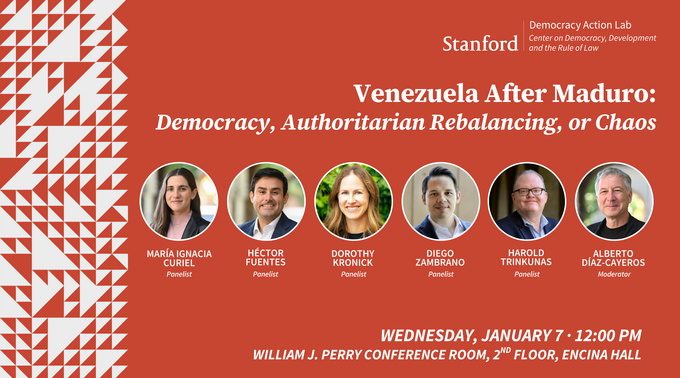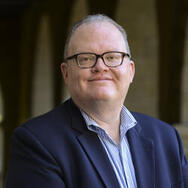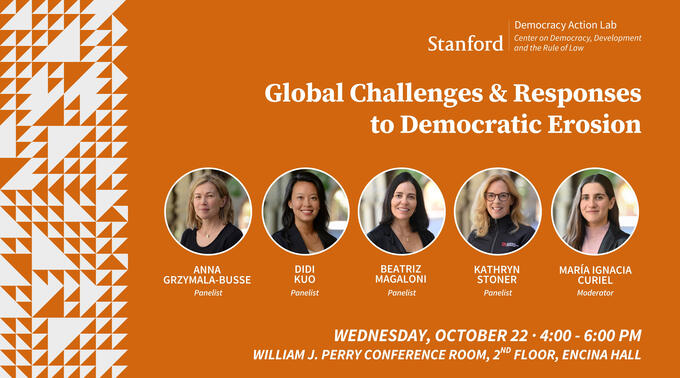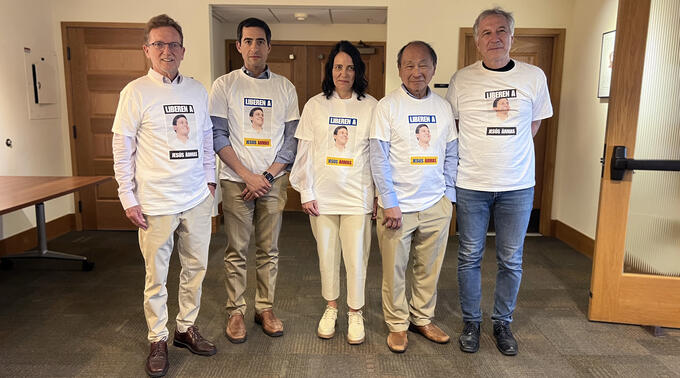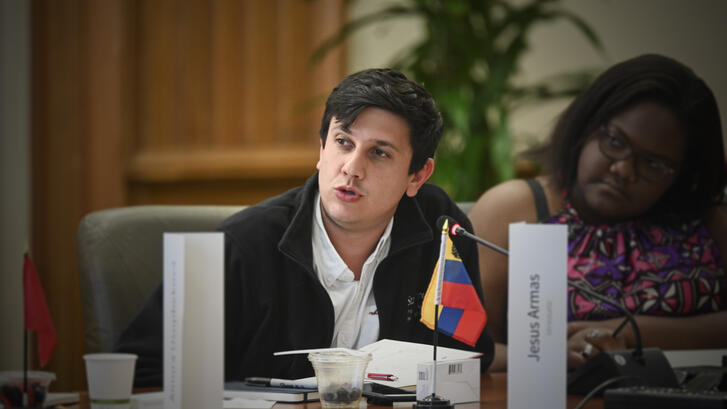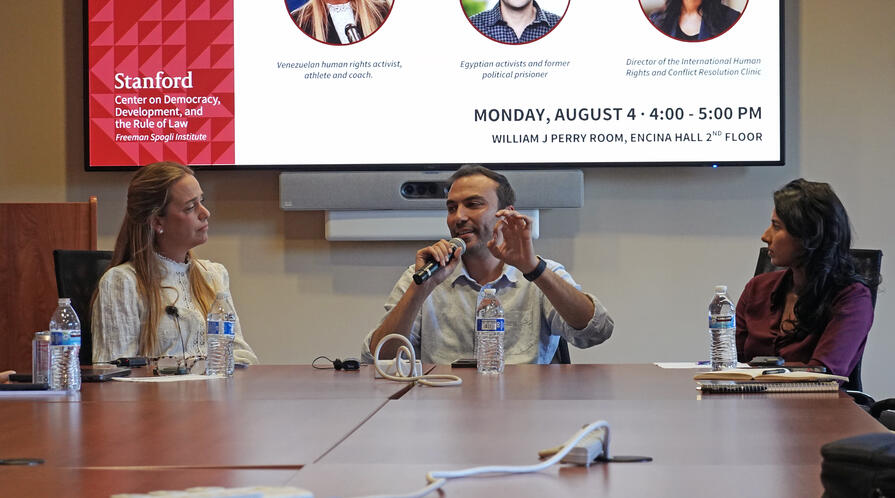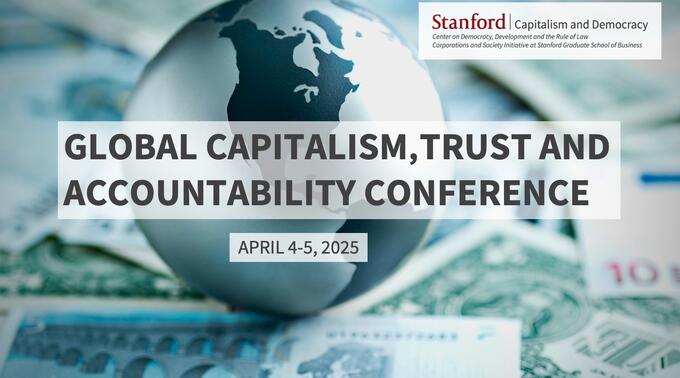FRIDAY, APRIL 4
1:30 - 1:45 — Introduction and Opening Remarks
Peter DeMarzo, Philip H. Knight Professor and Dean of the Graduate School of Business (Interim)
Kathryn Stoner, Mosbacher Director, Center on Democracy, Development and the Rule of Law
Didi Kuo, Center Fellow, Freeman Spogli Institute for International Studies
Anat Admati, George G.C. Parker Professor of Finance and Economics, Stanford Graduate School of Business
1:45 - 3:15 pm Session 1 — Why Trustworthy Governments are Essential
For markets and capitalism to continue producing broad-based prosperity, governments must maintain the institutions that underpin the market economy, ensuring that property and human rights are protected, that people have fair access to society’s resources and that contracts and laws are enforced effectively. This panel examines the forces that can help make institutions trustworthy or in turn cause trust to erode, framing key issues that the rest of the conference explores.
MODERATOR
Curtis Milhaupt, Stanford Law School
PANELISTS
Vic Khanna, University of Michigan Law School
Naomi Lamoreaux, Economics and History, Yale University
Alexander Cooley, Political Science, Barnard College
DISCUSSANT
Rick Messick, Global Anticorruption Blog
3:15 - 3:45 — Break
3:45 - 5:15 pm — Session 2: Opacity and Illicit Flows
The globalization of financial flows, and the opacity of the global economic system and of many governments, have increased opportunities for wealthy individuals, kleptocrats and terrorists to evade law enforcement. How can we conceptualize and measure these problems and the harm they cause? What is the role of anonymous and multinational corporations, secrecy jurisdictions, transnational actors, and cryptocurrencies in shaping these opportunities, and how might these problems be addressed?
MODERATOR
Victoria Baranetsky, The Center for Investigative Reporting
PANELISTS
Dan Nielson, Government, University of Texas at Austin
Gary Kalman, Transparency International US
Brooke Harrington, Sociology, Dartmouth College
DISCUSSANT
Mark Weidemaier, University of North Carolina School of Law
5:30 - 6:15 pm — Keynote: Investigating “the Brazen”
Tom Wright, Co-Founder of Project Brazen; co-author of the bestseller, Billion Dollar Whale: The Man Who Fooled Wall Street, Hollywood, and the World; Former Wall Street Journal Asia Economics Editor
MODERATOR
Anat Admati, Stanford Graduate School of Business
6:30 — Reception and Dinner
SATURDAY, APRIL 5
8:00 - 8:30 am — Breakfast
8:30 - 9:15 am — Keynote: Is Cryptocurrency a Racket?
Judge Jed Rakoff, Senior Judge of the United States District Court for the Southern District of New York
MODERATOR
Rohit Chopra, Former CFPB Director and FTC Commissioner
9:15 - 10:45 am — Session 3: The Law and Politics of Fighting Corruption
Can democratic governments and global institutions. through laws and international agreements, address corruption in its many forms within and across jurisdictions? What are the political forces that interfere with such efforts? This panel examines the mechanisms and tools that are available to policymakers, media and the public, to fight corruption in the private sector and in government, and the political and institutional challenges.
MODERATOR
Luigi Zingales, University of Chicago Booth School of Business
PANELISTS
Kevin Davis, New York University School of Law
Gerhard Schick, Finanzwende, Germany
John Githongo, Kenya
DISCUSSANT
Vikrant Vig, Stanford Graduate School of Business
10:45 - 11:15 am — Break
11:15 am -12:45 pm — Session 4: Greed, Norms, Culture, and Trust
Norms and culture, both in corporations, in government bodies, and in society at large, play a significant role in promoting trust and preventing misconduct. Global capitalism and democratic institutions reflect norms, but they also reshape them. This panel investigates the societal and democratic norms shaping transparency, whistleblowing, ways to hold power to account, and ultimately trust in institutions.
MODERATOR
Didi Kuo, Freeman Spogli Institute for International Studies, Stanford University
PANELISTS
Jonathan Katz, The Brookings Institution
Peter Solmssen, Former Siemens AG
Miriam Baer, Brooklyn Law School
DISCUSSANT
Paola Sapienza, Hoover Institution, Stanford University
12:45 - 1:45 pm Lunch
1:45 - 3:15 pm — Session 5: Corporate Misconduct and the Law
What are the tools for deterring corporate misconduct, and are these tools being used effectively? This panel of experts on white-collar crime will explain why laws and enforcement mechanisms may fail to deter corporate misconduct and why corporate leaders are rarely appropriately held accountable. What is the interplay of institutions, politics, and power that undermines the rule of law in the corporate context?
MODERATOR
Anat Admati, Stanford Graduate School of Business
PANELISTS
Ellen S. Podgor, Stetson University College of Law
Elizabeth Pollman, University of Pennsylvania Carey Law School
Fabio De Pasquale, Public Prosecutor's Office, Milan, Italy
DISCUSSANT
Jennifer Taub, Wayne State University Law School
3:15 -3:45 pm — Break
3:45 -5:15 pm — Session 6 (Round Table): What Academics, Activists, and the Media Can Do
This roundtable will enable all participants to brainstorm how academics, activists, and journalists can work together to accomplish shared goals around global capitalism and accountability. How are each sector's resources, voices, and contributions best deployed? How might individuals and organizations align their work and objectives? And most importantly, how might we create a more trustworthy and fair economic system for the 21st century?
MODERATOR
Bethany McLean, Vanity Fair
5:15 - 5:30 pm — Closing Remarks
5:30 pm — Closing Reception

